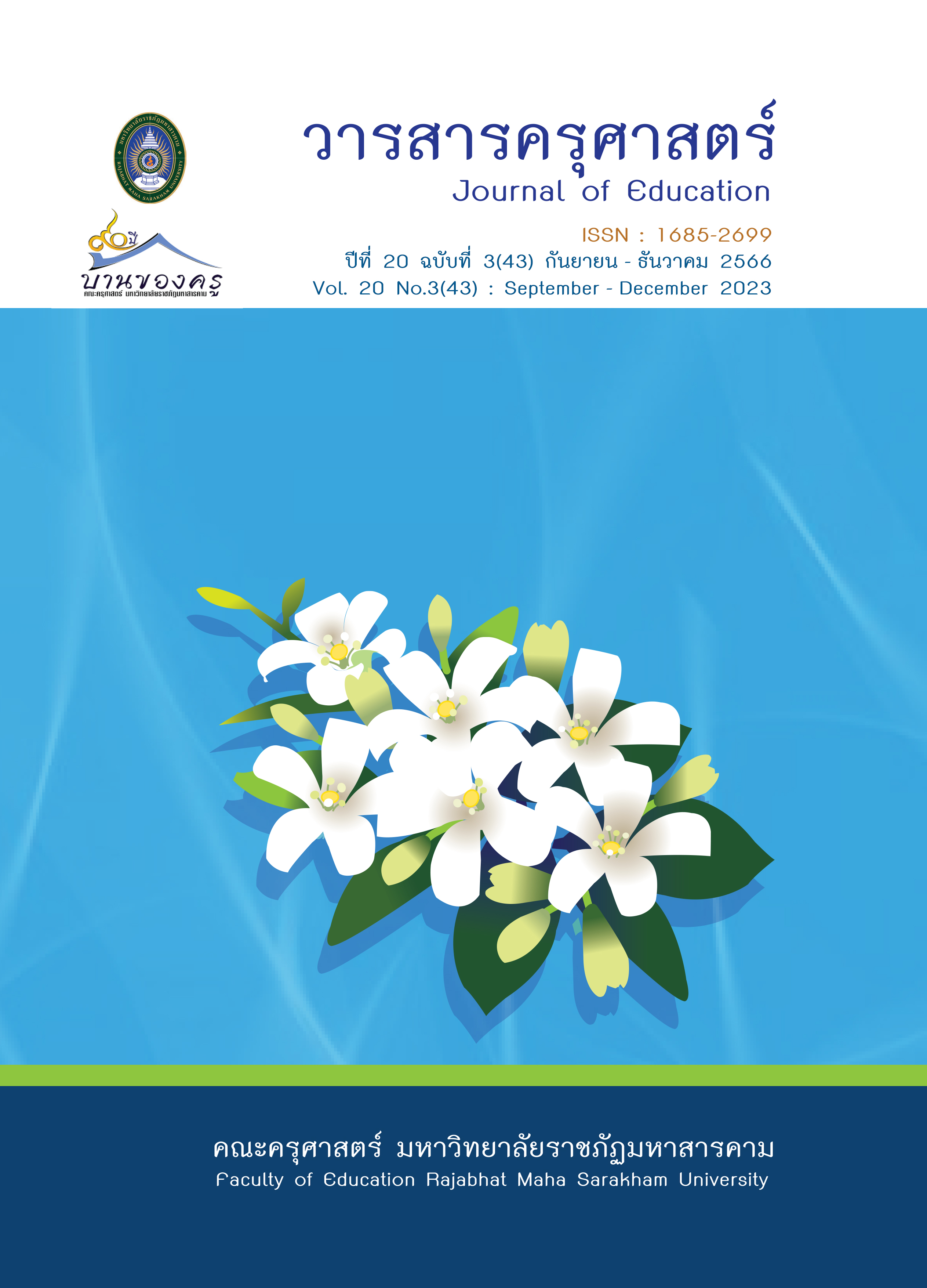Enhancing the resilience early childhood through the participation strategy of the family, schools, communities and information technology
Main Article Content
Abstract
This article aims to present perspectives on strengthening the mind. Through strategies of participation from many sectors, including 1) family, providing parenting to enhance all aspects of development, giving love, warmth, building good relationships for children to feel secure and have the power to learn and grow. 2) Educational institutes have curriculum and learning management processes that stimulate creativity, help children see self-esteem and have the ability to solve problems. 3) Community is an environment conducive to learning social skills. participation making contributions for the common good; and 4) Information Technology It is an effective tool to promote learning and communication. Access to information and knowledge through technology empowers them to think critically and solve situations that children may encounter in their daily lives. Therefore, strengthening the mental strength of early childhood children is considered to prepare the foundation of a person’s quality of life in order to grow up to be an important force of the country in the future.
Article Details

This work is licensed under a Creative Commons Attribution-NonCommercial-NoDerivatives 4.0 International License.
ข้อกำหนดเบื้องต้นที่ผู้นิพนธ์(ผู้ส่งบทความ) ควรทราบ
1. ผู้นิพนธ์ที่ประสงค์จะลงตีพิมพ์บทความกับวารสาร ตั้งแต่เดือนมกราคม 2563 เป็นต้นไป ให้ใช้รูปแบบใหม่ (Template 2563) โดยสามารถดูตัวอย่างได้ที่เมนู GUIDELINES
2. จะตีพิมพ์และเผยแพร่ได้ ต้องผ่านการประเมินจากผู้ทรงคุณวุฒิ (Peer Review)
3. การประเมินบทความโดยผู้ทรงคุณวุฒิ (Peer Review) เป็นแบบ Double Blind
4. การอ้างอิงบทความใช้หลักเกณฑ์ APA (American Psychological Association) คลิก
5. บทความถูกปฏิเสธการตีพิมพ์ ไม่ผ่านการประเมิน ผู้นิพนธ์ขอยกเลิกเองหรือชำระเงินก่อนได้รับการอนุมัติ ทางวารสารไม่มีนโยบายการคืนเงิน
References
กนกวรรณ ขวัญอ่อน. (2561). การพัฒนาบุคลากรให้มีความแข็งแกร่งทางใจด้วยกระบวนการ RQ (Resilience Quotient). https://webportal.bangkok.go.th/upload/user/.
กรมสุขภาพจิต สถาบันราชานุกูล. (2564, 25 พฤศจิกายน). กิจกรรมออนไลน์ “อ่านยาใจ : สร้างภูมิคุ้มใจเด็กปฐมวัย” ผ่านเฟซบุ๊ก “อ่านยกกำลังสุข” . https://th.rajanukul.go.th/.
กลุ่มพัฒนาการศึกษา สำนักงานศึกษาธิการภาค 10 สำนักงานปลัดกระทรวงศึกษาธิการ กระทรวงศึกษาธิการ. (2561). การศึกษาสภาพปัญหาการส่งเสริมและพัฒนาการจัดการศึกษาปฐมวัย (อนุบาล 1–3). สำนักงานศึกษาธิการภาค 10 สำนักงานปลัดกระทรวงศึกษาธิการ กระทรวงศึกษาธิการ.
กองส่งเสริมและพัฒนาสุขภาพจิต กรมสุขภาพจิต (มปป.). เสริมสร้างความเข้มแข็งทางใจ อึด ฮึด สู้. กองส่งเสริมและพัฒนาสุขภาพจิต กรมสุขภาพจิต.
จุฑาพิชญ์ วณิชกิจ และเพ็ญศรี แสวงเจริญ. (2565). การพัฒนาคู่มือผู้ปกครองเพื่อส่งเสริมความเข้มแข็งทางจิตใจแก่เด็กปฐมวัยในสถานการณ์ COVID-19. วารสารวิทยาลัยนครราชสีมา (สาขามนุษยศาสตร์และสังคมศาสตร์), 16(2), 181-194.
ชุติมา เล็กพงศ์. (2565). การส่งเสริมรากฐานการเรียนรู้: ก้าวย่างที่สำคัญจากปฐมวัยสู่ประถมศึกษา. วารสารวิชาการการจัดการภาครัฐและเอกชน, 4(2), 196-206.
ทวีศักดิ์ ศิริรัตน์เลขา. (2561). คู่มือการดูแลสุขภาพจิตเด็กกลุ่มปัญหาการเรียน (สมาธิสั้น แอลดี ออทิสติก บกพร่องทางสติปัญญา เรียนรู้ช้า). ศูนย์สุขภาพจิตที่ 13,
ท้อฟฟี่ แบรดซอว์. (2564, 24 กันยายน). Resilience ล้มเหลว เรียนรู้ สู้ต่อ. https://www.eef.or.th/article- resilience/.
ณัฐยา เชิงฉลาด ชูพรม. (2560). แนวทางส่งเสริมการมีส่วนร่วมของชุมชนเพื่อการดูแลสุขภาพเด็กปฐมวัยในศูนย์พัฒนาเด็กเล็กขององคกรปกครองส่วนท้องถิ่น. The 9 th NPRU National Academic Conference Nakhon Pathom Rajabhat University, Nakhon Pathom, Thailand, 28-29 September 2017.
ธัญพิชชญา พิมพ์ดี. (2021). การพัฒนาการมีส่วนร่วมของชุมชนในการส่งเสริมพัฒนาการเด็กเล็กกรณีศึกษา: ตำบลนิคมคำสร้อย อำเภอ นิคมคำสร้อย จังหวัด มุกดาหาร. วารสารวิจัยและพัฒนาระบบสุขภาพ, 14(2), 320-332.
ธิดา พิทักษ์ สินสุข. (2019). วิกฤตปฐมวัยกระทบอนาคตชาติ. วารสารการจัดการทางการศึกษาปฐมวัย, 1(1), 77-89.
ปณิชา ภัทรกิตติ์ธำรง, เสาวณีย์ สิกขาบัณฑิต และขวัญหญิง ศรีประเสริฐภาพ. (2566). รูปแบบการบริหารจัดการการศึกษาปฐมวัยเพื่อส่งเสริมทักษะทางอารมณ์และสังคมในสถานศึกษาเอกชนพื้นที่กรุงเทพมหานคร. วารสารเทคโนโลยีภาคใต้, 16(1), 29-39.
พิมลพรรณ อิศรภักดี. (เมษายน-พฤษภาคม 2560). ลักษณะครอบครัวไทยเปลี่ยนไปอย่างไรในกว่า 20 ปีที่ผ่านมา. วารสารประชากรและการพัฒนา, 37(4), 6-7.
ราชบัณฑิตยสภา. (2564). พจนานุกรมฉบับราชบัณฑิตยสถานพจนานุกรมฉบับราชบัณฑิตยสถาน. https://dictionary.orst.go.th/.
รุ่งลาวัลย์ ละอำคา. (2557). ทักษะชีวิตของเด็กปฐมวัย: แก่นแห่งชีวิตที่เสริมสร้างได้จากครอบครัว. วารสารวิจัยเพื่อพัฒนาสังคมและชุมชน มหาวิทยาลัยราชภัฏมหาสารคาม, 1(2), 33-44.
เลขาธิการสภาการศึกษา และองค์การทุนเพื่อเด็กแห่งสหประชาชาติ(ยูนิเซฟ) ประเทศไทย. (2561). แนวแนะวิธีการเลี้ยงดูดูแล และพัฒนาเด็กปฐมวัย ตามสมรรถนะ เพื่อเพิ่มคุณภาพเด็กตามวัย 0-5 ปี. พริกหวาน กราฟฟิค.
วรรธนา นันตาเขียน, กุลภัสสรณ์ ตั้งศิริวัฒนากุล และสุกัลยา สุเฌอ. (2560). ทักษะชีวิตของเด็กปฐมวัย ในยุคประเทศไทย 4.0, วารสารการศึกษาและการพัฒนาสังคม, 13(1), 7-18.
สายสุดา ปั้น ตระกูล, กาญจนา เผือกคง และ ปริศนา มัชฌิมา. (2563). การศึกษาสภาพการใช้เทคโนโลยีสารสนเทศในการเรียนการสอนระดับอนุบาลในโรงเรียนสังกัดกรุงเทพมหานคร. วารสารสมาคมนักวิจัย, 19(2), 81-91.
เสาวลักษณ์ สุวรรณไมตรี. (2552). คู่มือการให้การปรึกษาเพื่อเสริมสร้างพลังสุขภาพจิต. สำนักพัฒนาสุขภาพจิต กรมสุขภาพจิต กระทรวงสาธารณสุข.
อภิพร เป็งปิง. (2562). ความเข้มแข็งทางจิตใจของเด็กในห้องเรียนอนุบาล. วารสารครุศาสตร์จุฬาลงกรณ์ มหาวิทยาลัย, 47(ฉบับเพิ่มเติม 2), 369-384.
อัครพล ไชยโชค. (2562). การใช้เทคโนโลยีอย่างสร้างสรรค์ ปลูกปั้นเด็กปฐมวัยในศตวรรษที่ 21. วารสารครุศาสตร์ จุฬาลงกรณ์มหาวิทยาลัย, 47(4), 519-538.
American Psychological Association. (2023). Resilience. APA Dictionary of Psychology. American Psychological Association.
Bernard, B. (1995). Fostering resilience in children. https://files.eric.ed.gov/fulltext/ED386327.pdf.
Heckman, J. J., García, J. L., Leaf, D. E., & Prados, M. J. (2017). The life-cycle benefits of an influential early childhood program (No. w 22993). National Bureau of Economic Research.
Furu, A. C., Chan, A., Larsson, J., Engdahl, I., Klaus, S., Navarrete, A. M., & Turk Niskač, B. (2023). Promoting resilience in early childhood education and care to prepare children for a world of change: A critical analysis of national and international policy documents. Children, 10(4), 716.
Grothberg, H.E. (1995). A guide to promoting resilience in children: Strengthening the human spirit. The Hague, Netherlands: Bernard Van Lee Foundation.
Goto, A., Lloyd Williams, A., Okabe, S., Koyama, Y., Koriyama, C., Murakami, M., & Nollet, K.E. (2022). Empowering children as agents of change to Foster Resilience in Community: Implementing “Creative Health” in primary schools after the Fukushima Nuclear Disaster. International Journal of Environmental Research and Public Health, 19(6), 3417.
Liu, T., Zhang, X., & Jiang, Y. (2020). Family socioeconomic status and the cognitive competence of very young children from migrant and non-migrant Chinese families: The mediating role of parenting self-efficacy and parental involvement. Early Childhood Research Quarterly, 51, 229-241.
Mort, M., Rodriguez-Giralt, I., & Delicado, A. (2020). Children and Young People’s Participation in Disaster Risk Reduction: Agency and Resilience. Policy Press.
Nakazawa, D. J. (2015). Childhood disrupted: How your biography becomes your biology, and how you can heal. Simon and Schuster.
Seiler, L. (2008). Cool Connections with Cognitive Behavioural Therapy: Encouraging Self-esteem, Resilience and Well-being in Children and Young People Using CBT Approaches. Jessica Kingsley Publishers.
Su, J., Zhong, Y., & Chen, X. (2023). Technology education in early childhood education: a systematic review. Interactive Learning Environments, 1-14.
The Cambridge Business English Dictionary. (2021). Definition of resilience. Cambridge University Press.
Trevarthen, C. (2011). What young children give to their learning, making education work to sustain a community and its culture. European Early Childhood Education Research Journal, 19(2), 173-193.
Yoon, S., Pei, F., Benavides, J. L., Ploss, A., Logan, J., & Hamby, S. (2022). The long-term effects of early childhood resilience profiles on school outcomes among children in the child welfare system. International journal of environmental research and public health, 19(10), 5987.
Young, A., Rogers, K. D., Green, L., Daniels, S., Zand, D. H., & Pierce, K. J. (2011). Resilience in Deaf Children: Adaptation Through Emerging Adulthood. Springer.


